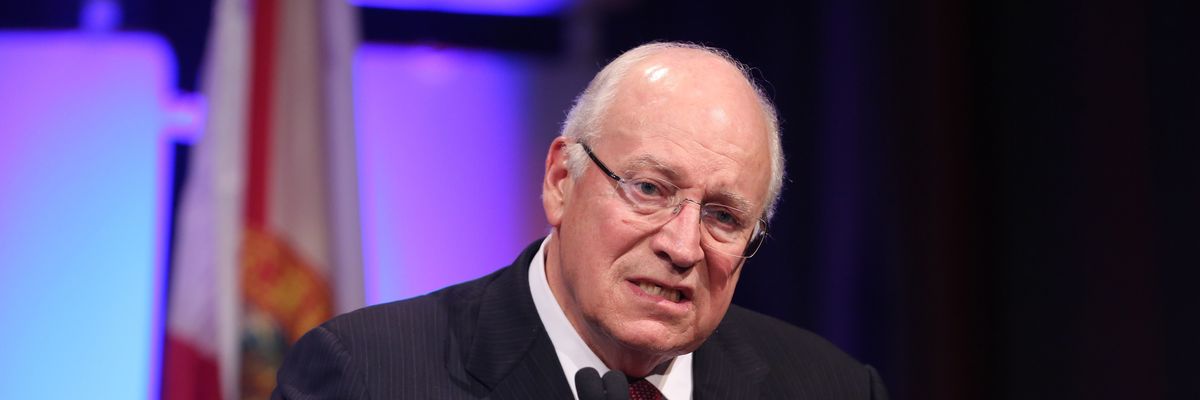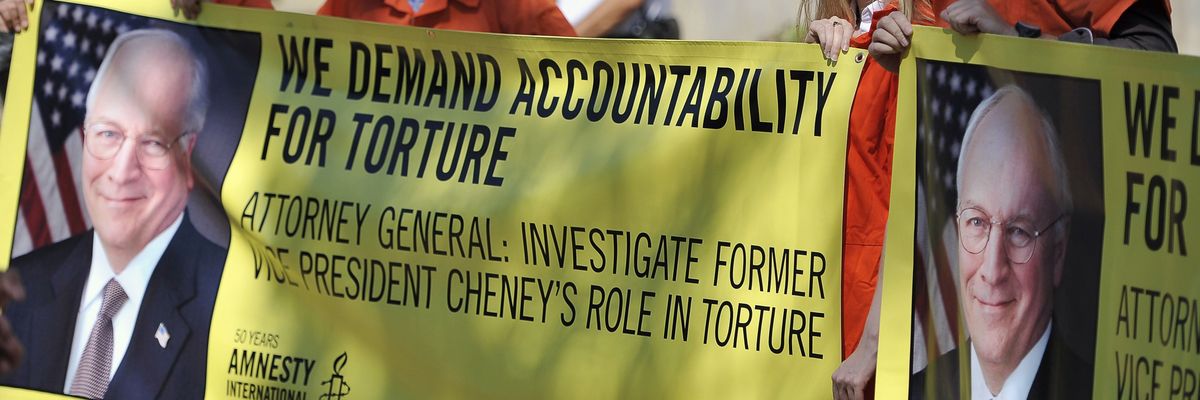Your Party exists! Now the hard work begins…
Wednesday 3 December 2025, by Simon Hannah, Terry Conway
Your Party’s founding conference was a battleground between unelected bureaucrats and the left, but in the end it has produced a new socialist and working-class party.
The road to the founding conference was publicly torturous and displayed some of the worst aspects of some people on the left. Bickering over data and control, public spats and arguments, brash actions clashing with ingrained conservative caution. Certainly, the energy from the start of August, when 800,000 people signed up as supporters, had dissipated with all the public rows over data control and money. The question for this conference was whether the party would survive and even turn its fortunes around.
Your Party held its founding conference in Liverpool on 29-30 November. Despite the problems, a new left socialist and working-class party has been launched, and there is a crying need for it. This article is about the events at the conference, which was a mixed affair, but ACR remains committed to building an ecosocialist party, and Your Party is still a possible way to make that happen.
The rise of Zack Polanski’s Greens has also closed the space for another ‘left party’, so another crucial question is how Your Party can clearly stand out as a socialist party that is not merely electoralist.
Between the original launch/launches, little happened until well into November, meaning that people were only asked to come to Liverpool through this opaque and undemocratic sortition process late in the day – excluding many of those with less money, caring responsibilities, access needs, and so on.
The process at the conference was also unclear until the event. The agenda – circulated to the press before the membership – was dominated by platform speakers and was only available just before the conference started. There was no opportunity for the conference or the membership to amend the timetable or promote particular motions on the conference floor.
You can see which ‘motions’ got how many endorsements, but not why some made it onto the agenda, and others did not. No one knew how the chairs were selected or their relationship with the mysterious standing orders committee, which never reported.
There were some good changes before the conference, as feedback from the regional assemblies led to improved ‘evolved’ founding documents. Improved focus on the climate emergency, redefining who can be a member to include non-UK citizens and that the constitution/standing orders committee can be amended by a simple majority at the next conference, before raising the threshold to a 2/3rd super majority.
But despite all this, the conference was largely a success and showed that there is a serious left in Your Party that defied and beat the unelected bureaucrats running things behind the scenes on several key issues. Much debate needs to happen in local groups and other fora about how to build on the successes and address the weaknesses.
Witchhunt
There was an ominous mood the day before the conference as messages filtered through that SWP leaders had been expelled for being ‘members of a national political party’. This was one of the rules in the ‘interim constitution’ which was foisted on potential members. When John Rees from Counterfire queried Jeremy Corbyn about it, Corbyn replied that it probably only referred to registered (therefore potentially rival) political parties.
Nevertheless, on the eve of the conference, SWP leaders were expelled en bloc, including Alex Callinicos, who wasn’t even a member of YP. Then on Saturday morning, Counterfire’s Michael Lavalette, elected as an independent councillor in Preston, was excluded from conference too, as was James Giles, an independent councillor from Kingston who chaired Sultana’s Friday rally.
There was clearly a fear that the SWP and Counterfire – as part of the Socialist Unity Platform – would submit an emergency motion calling for the election of a collective leadership at the conference. A rumour had circulated that people might ‘storm the stage’ – which was not a real thing but was used as an excuse to ban people.
Because of these manoeuvres, Zarah Sultana’s eve of conference rally was electric. A packed room, hearing a range of speakers with a strong class-struggle message. By comparison, Corbyn’s rally was downgraded to a ‘cultural event’ featuring poetry, which had far fewer people in attendance.
Conference begins
The Conference itself on day one was a stage-managed affair. Attempts to challenge standing orders were shut down (the live feed was cut, which added to the Orwellian vibes). The ‘road map’ debates were simultaneously extensive – “should the new party be based on the working class?” – but also superficial. How can you debate the nature of class in a serious way at a conference with very little time?
That the party being socialist and working class was even a debate point was ridiculous. The balance between platform speakers and ordinary members was heavily tilted to the former. That the political statement could not be amended apart from the ‘road map’ pre-determined debates was poor and clearly politically motivated. As was the fact that you could not debate or amend the Standing Orders for the conference. This was undemocratic and short-sighted.
Due to expulsions and exclusions, the debate over dual membership dominated the day, which was a shame given everything else going on in the world. The two options were not great, but Option A, which allows the CEC to ‘white list’ organisations you can be in and still be a member of YP, was better.
The mood on Saturday, after the conference ended, was generally not positive. However, the results announced in the morning for the day’s votes showed that the left’s recommendations had an impact. In particular, the support for collective leadership was seen as forward-looking rather than nostalgic, and the vote against the ban on dual carding was seen as a victory against the witch-hunt.
Many people had been angry that Zarah refused to speak until after lunch on Sunday, but in practice, this was the perfect timing. Partly it allowed her to celebrate the success mentioned above, but also to intervene in a live debate.
At this point, members were asked to vote on both the political statement and the constitution, as amended the previous day. If these votes had not passed, there would be no agreed basis for moving forward. Despite this, several groups argued for rejecting the constitution. There was a rumour that the Corbyn camp was discussing this, but we saw no evidence – though we did see one person who could be defined as a Corbyn loyalist argue that position and back down when called out. Zarah made absolutely clear, to loud applause, that she was asking for endorsement.
In the end, both the political statement and the constitution were passed overwhelmingly. At the same time, there were other frustrations on the conference floor. One was that a high proportion of those speaking on Sunday had done so before – or more than once. That felt unfair – and definitely weighted towards organised groups despite the witchhunt.
Another was that there was no way to weigh debates by their importance or contention, so some seemed ritualistic, with no way to move to the vote earlier, while others were rushed or undermined by the fact that we were having to choose between two poor options rather than a multiplicity of nuanced ones.
The third was that some debates did not make it to the conference. We were relieved in some ways that the argument that Your Party should organise in the North of Ireland did not reach the conference floor – to prioritise that would have been bad news, and to agree to it would be a colonial disaster. Conversely, the fact that trans rights were debated and received overwhelming support in the hall was excellent.
But disabled people, while mentioned by several top table speakers, faced practical exclusion from a process that tokenised them by asking if they had access needs and not responding as to whether these could be met. Having signers is great – but failing to remind delegates to stop shouting because it blocks closed captions is not. Having no debate as to how Your Party can meet the needs of disabled people is not acceptable.
The other major topic excluded from debate was done in an even more grotesque manner – that of a worker’s wage. This had been selected for endorsement at the beginning of the weekend and was suddenly removed for what seemed like nebulous reasons, leaving everyone to assume objections were coming from those who would be most impacted.
Votes and names
Then there was the damp squib of the decision on the name. Most people we spoke to were unhappy with the limited choice and unconvinced by the argument that these were the only options the Electoral Commission allowed. There was no transparent report about what had been excluded and why. And many felt that the label was not the most critical question, although more than 10,000 voted in this poll. This, alongside the vote to make the party explicitly socialist and to incorporate support for trans liberation, was one of the three votes with the most participants.
On the members portal, you can see a bar chart showing the percentage of voters for each option, along with the absolute number for the winning option. The first thing is that the percentage participating is low – the portal on the constitution, for example, states: ‘Only active full members with verified identities could vote on this. The total number of members that fit these criteria was 22266’. So, of the more than 55000 members who signed up, less than half are ‘verified’. There is no way of knowing what percentage of that is because they are demoralised by the infighting, deterred by the tech or excluded in other ways.
The votes that came in on Monday from Sunday’s debates were more mixed for the left and represent the confused debates that took place. The positive result, following an impressive speech from Liz Wheatley from Camden UNISON and the SWP, was on incorporating anti-oppression principles – understood as particularly meaning trans liberation, certainly by anyone in the room or on the livestream. The support for the right to recall branch officers was also good, as was the proposal for an explicitly, if vague, anti-austerity stance by candidates in the May elections.
However, the end result was that the online votes agreed to enshrine online voting at the branch and conference level. No doubt some people did this for reasons of inclusion. Online voting is atomised and carried out by people who might not have heard any of the conference debates. The votes can also be subject to manipulation, with prominent social media personalities calling on people to vote in particular ways, with no account taken of the mood of conference delegates.
Having online votes on conference decisions also undermines the basis for attending the conference. For us, inclusion means that meetings should be hybrid and held in accessible venues. It means there needs to be a conscious effort to elect inclusive delegations and to take full reportbacks. Collective discussion is key to the mass working-class party that we need to build.
In a situation where the organisation is just being created, where there have not been assemblies in all areas or meetings called at very short notice, where adverts for meetings have not been sent to all paying members and where there have been sectarian carve-ups in some localities, that is not everyone’s experience.
So the conference decided that the next one should combine elected delegates with some sortition and that ‘local policy initiation is determined by online voting systems, open year-round for local member engagement’ and ‘Motions to conference are selected by an all year round voting system’. The total of these votes is confused, confusing and, whatever the intentions of those promoting them, ultimately undemocratic.
So this is where the work begins. The task is to build inclusive, accessible democratic branches where everyone has an opportunity to participate. Campaigning around elections needs to be combined with involvement in communities, local campaigns, and trade unions. National and regional structures and caucuses of the oppressed should be developed on the same principles. Big opportunities to go forward, huge responsibilities as well.
Your Party will be made or broken by how it turns out to the broader world and becomes a useful party in the class struggle. It has to reach out to provide alternatives to austerity, to all forms of discrimination and to imperialism and to argue for a socialist society. If it stays stuck in internal wranglings, it will wither and become a rump organisation.
1 December 2025
Surce: Anti*Capitalist Resistance.
Attached documentsyour-party-exists-now-the-hard-work-begins_a9294.pdf (PDF - 919.5 KiB)
Extraction PDF [->article9294]
Terry Conway is a supporter of Socialist Resistance, which collaborates with the Fourth International
Simon Hannah is a member of Anti*Capitalist Resistance and author of several books on political activism in Britain.

International Viewpoint is published under the responsibility of the Bureau of the Fourth International. Signed articles do not necessarily reflect editorial policy. Articles can be reprinted with acknowledgement, and a live link if possible.
Everything you need to know about what happened at Your Party’s founding conference
It wasn't a chilled affair...

It’s unlikely that many people were expecting the founding conference of Your Party to be a chilled affair. But if they were, they’d have been bitterly disappointed, as Left Foot Forward learnt reporting on the ground and from the conference hall. It was at times a somewhat chaotic with public spats, open divisions and controversies rife throughout.
It did end on a firmly uninteresting note though, as Jeremy Corbyn announced that members had voted for the party’s name to remain ‘Your Party’. But that was a rare moment of stability at a conference that appeared for much of its duration anything but stable.
Because it started very dramatically. Late on Friday – the day before the conference formally opened – it came to light that leading members of the Socialist Workers Party (SWP) had been expelled from Your Party for being members of more than one party. This became a key backdrop for Zarah Sultana’s rally held on the same evening, where members gathered to call for more democracy in the party going forward.
At that rally, allegations were thrown around against ‘faceless, nameless bureaucrats’ within Your Party and claims that a ‘witch-hunt’ was being coordinated. One attendee even accused Jeremy Corbyn himself of carrying out that ‘witch-hunt’, something he was forced to deny as ‘absurd’ the following morning at a press huddle immediately before he delivered his opening speech to the conference.
In that speech, Corbyn made a strong plea for unity within the party at the conference, imploring members to “listen to each other, learn from each other, and be respectful to each other”.
That plea didn’t seem to be heeded by Sultana, who arrived at the conference venue to tell journalists that there was a ‘toxic culture’ within the party. After she’d spoken to a huddle of the media, she then promptly turned around and walked up the hill away from the venue.
It later became clear that she was boycotting the event and refusing to enter the venue as a result of the ‘witch-hunt’. She maintained that boycott for the remainder of the first day of the conference.
Meanwhile, while all this was playing out outside of the main conference hall, members were inside thrashing out the founding documents of the new political party. A series of votes were held over the weekend on key elements of the party’s structures, as well as its ‘political statement’ – a broad document which establishes the party’s ideological grounding.
In an extremely narrow vote, members backed a ‘collective leadership’ model, where there will be no single party leader and instead a central executive committee (CEC) will be elected and appoint people to be public facing spokespeople. Alongside this, members endorsed structures which will see local branches have autonomy over their spending and to allow Your Party members to hold ‘dual membership’ with other like minded political parties, a list of which will be determined by the CEC. For those still keeping up, these constitutional arrangements and democratic structures were all advocated for by Sultana.
Speaking of Sultana, once she had broken her boycott of the founding conference of the party she was founding, she delivered her keynote address to members on Sunday afternoon. Despite having won all the major votes at the conference, she didn’t strike a conciliatory tone. Instead, she used her address to once again hit out at those ‘nameless, faceless bureaucrats and argued that the expulsion of members was “undemocratic” and an “attack on members and this movement”.
What do the other MPs involved in setting up Your Party make of all this? There are two of them left (Adnan Hussain and Iqbal Mohamed both quit in the run up to the conference), and Left Foot Forward interviewed both of them this weekend.
Shockat Adam – who unseated Jon Ashworth in the 2024 general election – said that he doesn’t ‘believe in expulsions’ in the aftermath of SWP members being given the boot. He also told Left Foot Forward that he thought that the disagreements they are having now internally within Your Party “will make us stronger”, adding “I think we can get out differences out the way now, and that will make us a lot stronger for the future.”
Meanwhile, Ayoub Khan – the fourth and final Your Party MP – told Left Foot Forward that Your Party ‘is the vehicle that can deliver real change and hope’. He also said he wanted to see electoral collaboration between Your Party and the Greens.
What does this all mean for Your Party going forward? The left wing journalist Owen Jones was reporting from the conference, and Left Foot Forward asked him about just this. He wasn’t particularly optimistic, comparing Your Party’s founding to the infamous and disastrous Fyre Festival and branding it a ‘clusterf*ck’.
Well, in the coming months we’ll see whether labels like that stick, and whether the party can – as Corbyn asked it to – unite. Your Party has indicated that elections to the new Central Executive Committee, which will in the future act as its leadership, will conclude by the end of February. That will be another key moment that will determine the fledgling party’s future.
Watch this space I guess…
Jeremy Corbyn Addresses The First Your Party Conference
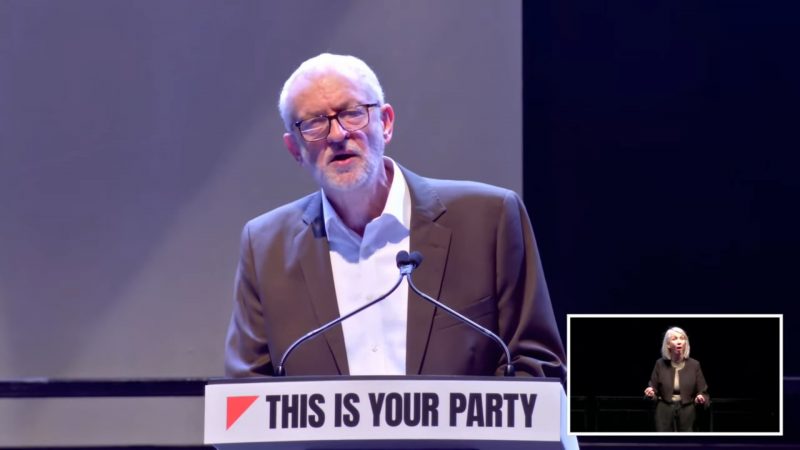
Jeremy Corbyn has issued a plea for unity at Your Party’s founding conference. Corbyn made the call in his keynote address to the conference.
“As a party, we’ve got to come together and be united because division and disunity will not serve the interests of the people that we want to represent”, he told the conference.
Elsewhere in the speech, he said that he wanted to create “a culture of unity and collaboration”, saying he wanted to see the party “listen to each other, learn from each other, and be respectful to each other.”
Corbyn said that this was the route to “found a socialist party with mass appeal in every part of the country”.
This plea for unity came after an extremely rocky start for Your Party which has seen public spats, legal threats and two MPs leaving. On the eve of the party’s conference, senior members of the Trotskyist group the Socialist Workers Party claimed they were expelled from Your Party, a move criticised by Zarah Sultana and her allies.
Aside from his call for unity within the party, Corbyn trod familiar ground in his speech. He rallied against wealth inequality, homelessness and privatisation of utilities.
He also dedicated part of his speech to the ongoing plight of the Palestinian people, at one point leading a chant of ‘free, free Palestine’ in the hall.
Chris Jarvis is head of strategy and development at Left Foot Forward
Ash Sarkar is joined by one of the most controversial political figures on the Left: Roger Hallam. Whether you like or loathe his tactics, it’s hard to deny the disruptive impact he has had through the activist organisations he has led; Extinction Rebellion and Just Stop Oil.
He joins us fresh from his latest stint in a prison cell, where he wrote a treatise for Your Party called ‘Grasping the Enormity of the Moment’. It’s a blueprint for a radical change, in which he sets out his vision for an emancipated future, and strategies for how to get there. Does Jeremy Corbyn and Zarah Sultana’s party still have potential? What is the point of sending activists to prison? And what role will Zoom calls play in the coming revolution?
00:00 Intro
02:40 Your Party’s Moment
05:18 The Revolutionary Potential of Zoom Calls
11:18 Creating Networks Through Door Knocking
14:50 Drawing Inspiration From the Belgian Workers’ Party
17:58 What Motivates People: Emotion Versus Reason
26:09 The Problem With the Censorious Left
34:11 What’s the Point of Political Prisoners?
44:09 The Demographics of JSO and XR
52:47 On Sortition
1:04:42 Building Relationships of Solidarity
1:11:40 Zack Polanski and the Green Party
1:14:22 Talking, Listening, Action
Your Party still called Your Party after two day conference
Left Foot Forward

TMembers of Your Party have voted to retain the name ‘Your Party’. This comes after over 2,000 party members attended the party’s founding conference in Liverpool.
‘Your Party’ was initially intended as a holding name for the party until members had voted on a new one. Four options were put to members – Your Party, Our Party, For the Many and Popular Alliance.
Along with deciding the party’s name, party members also this weekend voted on it’s democratic processes and its core political vision. Key votes saw the party adopt a ‘collective leadership’ model, rather than having a single leader; allowing ‘dual membership’ of Your Party and other aligned political parties, and explicitly describing the outfit as ‘socialist’ in its political statement.
The conference has not, however, been plain sailing. Throughout the weekend, spats between leading figures and MPs have spilled out into the public domain. Zarah Sultana even boycotted the first day of the event, alleging a ‘witch-hunt’ had taken place against left wing members following the expulsion of senior figures of the Socialist Workers Party. Your Party has denied a witch-hunt has taken place, instead claiming it was merely enforcing its published membership rules that prevented people being members of other parties.
Left Foot Forward
She didn't pull any punches
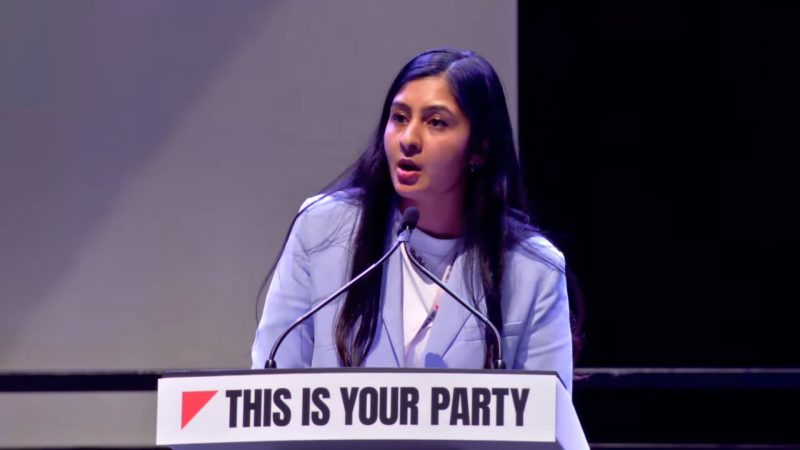
Anyone who hoped Zarah Sultana might strike a conciliatory tone in her speech to Your Party’s founding conference will be bitterly disappointed. After a weekend of intense divisions and disagreements among the leading figures of the fledgling party, Sultana used her speech to hit out against those she described as ‘nameless, faceless bureaucrats’ in the organisation.
She told attendees at the conference that the events over the weekend which saw some members of the Socialist Workers Party expelled from Your Party were “undemocratic”, and an “attack on members and this movement”.
She went on to describe one of those members being removed from the conference centre following their expulsion as “the shocking sight of a Muslim woman being manhandled and dragged out”.
Elsewhere in the speech, she said that “this party must never be captured from above – this party must never become a Labour 2.0”.
On what she has described as a witch-hunt of certain Your Party members over the weekend, Sultana said: “the members will not stand for this, the movement will not stand for this and I will not stand for this”.
Earlier in the conference, a Your Party spokesperson denied that a ‘witch-hunt’ had been carried out. They said: “These claims are false.
“Members of another national political party signed up to Your Party in contravention of clearly stated membership rules – and these rules were enforced.”
“We’re focused on hosting a democratic founding conference with thousands of members coming together to debate and decide the big issues”.
Sultana also used her speech to celebrate the decisions that had been taken over the weekend on the party’s new democratic structures – decisions which will see Your Party have a collective leadership rather than a single leader, will allow members of Your Party be permitted to also be members of other political parties with ‘shared aims’, and for local branches of the party to have autonomy over their spending.
She told attendees that this set the foundation for Your Party being “a mass, democratic working class movement – the largest socialist party in the UK since the 1940s”, and argued that the party would be “democratic, principled and rooted in the power of the working class”.
Much of the rest of her speech covered almost the exact same territory of the one she made at her pre-conference rally on Friday night.
The decision was a massive win for Zarah Sultana

Your Party members have voted to adopt a ‘collective leadership’ model rather than a single leader.
In an eye-wateringly narrow vote, 51.6 per cent of Your Party members backed the collective leadership model. This will see members elect a Central Executive Committee(CEC), with the party’s “Chair, Vice Chair, and Spokesperson in particular serving as the public political leadership”.
The decision is a major victory for Zarah Sultana and her allies who have been advocating fiercely for this model. By contrast, Jeremy Corbyn had made clear his support for a single leader.
Speaking following the announcement of the result of the vote, Sultana said: “I have fought for maximum member democracy since day one. Seeing members choose collective leadership is truly exciting.
“Together, we’re building a new socialist party – radically democratic and powered by a mass movement. This party will be led by its members not MPs. This is only the beginning.”
A Your Party spokesperson said: “This vote shows that we really are doing politics differently: from the bottom-up, not the top-down. In Westminster we have a professional political class increasingly disconnected from ordinary people, serving corporations and billionaires instead of the communities they are supposed to represent. With a truly member-led party, we will offer something different: democratic, grassroots, accountable.”
The party has said that elections to the CEC will conclude by the end of February. Until then, the process will be stewarded by those MPs who are members of the Independent Alliance and Your Party – ie. Corbyn, Shockat Adam and Ayoub Khan, but crucially not Zarah Sultana – alongside a sortitioned committee of ordinary members, a party source confirmed.
Party members also backed a litany of other democratic structures backed by Sultana. This included allowing member of Your Party to also be members of ‘other national political parties “where they have been approved by the CEC”.
The conference has taken place against the backdrop of members of Your Party who were also members of the Socialist Workers Party being expelled. It will be up to the new CEC to decide whether these people will have their Your Party membership reinstated.
80 per cent of Your Party members also voted to retain an explicit endorsement of ‘socialism’ in the party’s political statement.
The results of the vote on the name of the party are yet to be revealed. Four options were on the table: Your Party, Our Party, For the Many and Popular Alliance.
He also said voters were no longer 'chained like mental slavery'
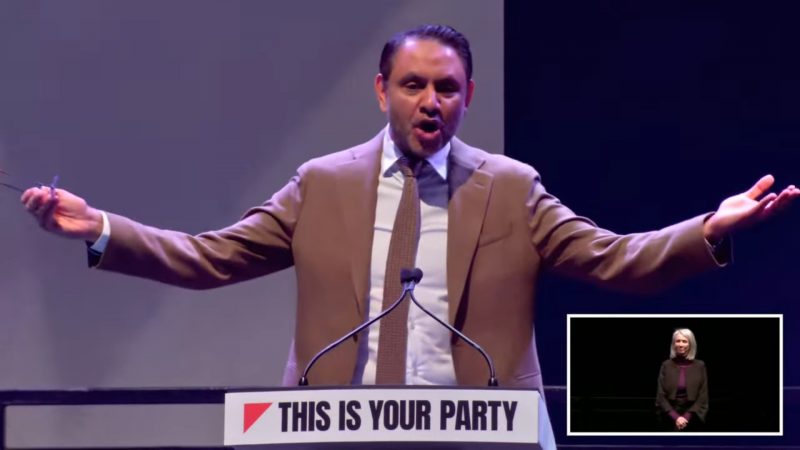
Your Party members are gathering in Liverpool this weekend for the party’s founding conference. Alongside debating and agreeing various constitutional and democratic processes, attendees heard from the four MPs who are also members of the party.
Shockat Adam is one of those MPs, and he addressed the main hall on Sunday morning. In his speech, he accused ‘mainstream parties’ of ‘colonising’ people’s minds and that and voters were no longer ‘chained to mainstream parties’ like ‘mental slavery’.
In referring to the small number of independent MPs elected to parliament at the last general election, he told the conference: “In a few pockets in a few constituencies people that were chained to mainstream parties, that were addicted to mainstream parties – you could be whoever or whatever they would have voted for that mainstream party – they were chained like mental slavery, suddenly said: ‘no, we no longer allow to be colonised in our minds by you, will no longer will colonised [in] our bodies by you. You have taken our support, our commitment, and even our love for too long and we will take this no longer.
“Because people got together, people organised, people began to believe that we can make the change. And you know what? In some constituencies, we overturned 22-23,000 majorities because that’s what people can do when they get together.”
Later in his speech, Adam echoed Jeremy Corbyn’s earlier call for ‘unity’ in Your Party, against the backdrop of significant public divisions.
Adam said: “We have this opportunity with Your Party to make that change. We have to make this change. We have to make this happen. We must unite. We must not allow small differences to disunite us. We will not succeed – we have to stay united to make that change, our country, our future depends on it.
“The hungry, the cold, the homeless, the children in Gaza, the mother in Sudan need this too work. As long as we can work together on principles of mutual respect, non-discrimination, and tolerance of all people of religion, belief or no religions.
“Otherwise we will fail. And we cannot afford to fail. We must unite this country. We must unite our differences. And we will not let our differences consume us. [Otherwise], we will fail, we will have let down our young and our future and they will not forgive us. We have the power to change. We have the power to rise. We must use it, and we need to do so now.”
Earlier in the conference, in an interview with Left Foot Forward, Adam said that he doesn’t “believe in expulsions”, following the news that senior members of the Socialist Workers Party had been expelled from Your Party on the eve of the conference.
Owen Jones compares Your Party to Fyre Festival and brands it a ‘clusterf*ck’

Leading left wing journalist Owen Jones has branded Your Party’s beginnings as a ‘clusterf*ck’, and compared it to the infamous and disastrous Fyre Festival. He made the comments in an interview with Left Foot Forward at the party’s founding conference in Liverpool.
Your Party’s (that is now its official name) founding conference was beset with infighting, divisions and public spats. One of its own MPs Zarah Sultana decided to boycott the first day of the conference, claiming that a ‘witch-hunt’ had been carried out within the party.
All of this followed senior members of the Trotskyist group the Socialist Workers Party being expelled from Your Party for being a member of both parties. Your Party denies claims of a ‘witch-hunt’, claiming that it was merely enforcing membership rules which at the time explicitly prohibited Your Party members being a member of any other political party.
And of course, this came after the various back and fourth dramas that have plagued the embryonic party in recent months, drama which has included two MPs – Adnan Hussain and Iqbal Mohamed – resigning from the party, legal threats issued by Sultana and others, and two separate membership schemes – one ‘official’ and one ‘unofficial’ being launched by different factions of the party.
Owen Jones was at the conference to film one of his widely watched videos of party conferences which involves him speaking to leading figures and rank-and-file party members.
Asked what the vibe of the conference had been following his conversations with members, Jones told Left Foot Forward that people were ‘quite frustrated’ that the political project being founded at the conference had been ‘to a large degree’ ‘trashed’.
He said: “There’s a lot of people here who are desperate for an alternative and want to make that work – often people who used to be in the Labour Party – and obviously vast numbers of people, both members and voters, have fled. I think a lot of people are quite frustrated because this was a project with huge potential which to a large degree has been trashed and I think people think that was totally unnecessary and I think I agree with them.”
Speaking specifically on the internal spats that have spilled out into the public throughout the conference, Jones said: “I think it’s ridiculous. I just don’t understand what the strategy is. If your interest is just trying to make something work and having problems and grievances which you want addressed, if that means just imploding the whole project, I don’t understand what the point of that is actually myself.”
He went on to compare these events to Fyre Festival – the infamous and disastrous failed musical festival. He told Left Foot Forward: “And I just think now having this – you know the main story in the Guardian is about chaos at Your Party – it’s just a bit Fyre Festival for people isn’t it? I think it’s a shame because I think with Jeremy Corbyn I think you’ve seen today that kind of traditional appeal he’s had. His kind of authentic, unpolished, quite moral emotional commitment to social justice and fighting injustice – and you can see that on show. But it’s just been crowded out by unnecessary drama.”
What’s the impact of all this? For Jones, the chaotic start to Your Party will lead to people on the left getting behind the Greens instead.
He said: “I think there’s this unique opportunity for the left to reach a mass audience, and I think people are just very pragmatic about where their energy went, and I just think because of the way this has unnecessarily had so many clusterf*cks, a lot of people just thought there’s too much drama and bad vibes and they decided ‘well I’m just going to conclude that the energy’s going to go through the Green Party for now’. And they’ve sort of left and just stopped paying attention I think.”
Later, when asked how Your Party’s founding conference compared to the Green Party’s conference earlier this year, Jones said: “Look, a lot of that membership are people who would have joined this party. But they haven’t because this is such a clusterf*ck.
“I just think there is just more excitement, more of a sense of purpose, here’s a big opportunity, let’s make the most of it. People are excited, they found a charismatic leader who’s communicating in a very effective way. They’ve turned the page on their own failures of communication which the Greens had which I kept critiquing. It’s just a lot more hopeful, optimistic, positive energy.”
Despite this, Jones said that he isn’t ‘writing off’ Your Party yet. He told Left Foot Forward: “There’s lots [of energy] here. That’s what’s annoying. Most people here want to do that, and actually are pissed off and I feel angry on their behalf. I feel angry for people who just wanted to take their idealism and build something new, exciting and inspiring, and I think they’ve been betrayed.
“I’m not writing this off because there’s all this – people have this energy here and all the rest of it, but they need to get their act together and move away from that. And again we’ve seen today – yet again – an attempt to double down on all the things that have made this project not the success it could have been.”
Chris Jarvis is head of strategy and development at Left Foot Forward
Image credit: Jwslubbock – Creative Commons
‘Your Party is a joke – but that doesn’t mean Labour can afford to laugh off all its lessons’
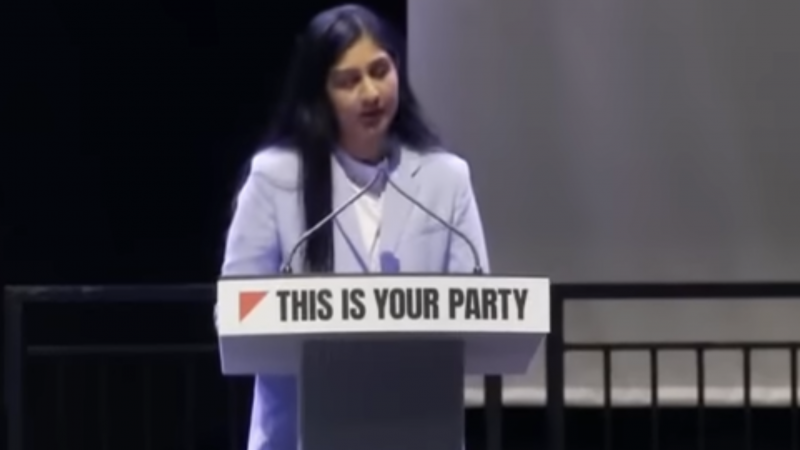
Could Your Party—now officially and, frankly, unfortunately named—have had a less auspicious start?
From the botched summer launch to the unanswered questions about where members’ joining fees actually went, and finally to this week’s conference—half of which was theatrically boycotted by one of the party’s own founding MPs—the story has been one long stumble from false start to stuttering restart.
But beyond the admittedly enjoyable schadenfreude, what do the inner workings of a party that has nothing to do with Labour (other than acting as a refuge for those who feel hounded out of it—and, occasionally, a repository for our rejects*) teach us about how Labour should be governed?
Many of us, myself very much included, have criticised the factional application of Labour’s rulebook when it has been used less to foster debate and more to suppress it. I’ve said this consistently, regardless of which faction was in charge or whether I voted for the leader at the time, because I genuinely believe the point of a collectivist party is to harness the strengths of the collective.
But collectivism has limits. And those limits require rules. Those rules must make sense—to the members who sign up to them and to the voters any party ultimately seeks to persuade.
I don’t withdraw a word of my criticism about the over-interpretation of Labour’s rules or their uneven and often punitive application. But I will say this: I am glad we have a rulebook. My frustration has rarely been with the existence of rules; it has been with their misuse. In truth, I probably believe in the rulebook more than many of those who have wielded it in an over-mighty way, because what I believe in is the fair application of rules—not the factional advantage they might confer.
Rules should be tools for strengthening an organisation, not weapons for controlling it. And what we saw at the weekend was not even an argument about how rules should be applied, but whether they should exist at all—and, if so, whether they could be flaunted or flouted depending on whether you were Team Jeremy or Team Zarah.
Much of the chaos in Your Party boils down to a factional tussle embodied by two figures—Jeremy Corbyn and Zarah Sultana—and their respective entourages, who act with great vocal enthusiasm to enforce the “rules” as they imagine them. And the reason the narrative centres on those two rather than the ten or twenty operatives behind them, each playing a Duplo version of Game of Thrones, is simple – politics need leaders. Politics is shaped by leaders. When those leaders refuse to give their politics a shape a vacuum is created.
So yes, the Life of Brian jokes are very funny—and entirely apt.
But beneath the comedy lies a real problem. People drawn to politics are often not the people you would trust to run an organisation. Your Party is designed to be led by a committee. Every policy to be decided by committee. Every rule to be hammered out by committee. And after this weekend’s rows, it’s hard to imagine this committee agreeing even a process for making decisions, let alone making the decisions themselves.
I’ve served on a lot of committees. Some are excellent. But they need strong leadership, processes and, yes, rules. Without these, they dissolve into groups of well-meaning nerds wanging on to each otherabout their pet policies while the important, boring business of running an organisation goes undone. The human equivalent of a Reddit thread.
People also need a figurehead. I find this instinct a bit odd—I’m too cynical to pin my hopes on any single human being—but it’s real, and anyone with the faintest understanding of politics has to grasp it.
Parties rise and fall with their leaders. That’s why having a deep bench matters: without one, the entire organisation becomes a vehicle for a single personality. The Greens may be enjoying their current Polanski-powered upswing, but it’s fragile because it rests on one person. Reform UK were nowhere until Farage returned; if he walked away tomorrow, they’d be nowhere again almost instantly. And in Labour, whenever murmurs about the leader begin, they immediately morph into speculation about succession. Think Gordon Brown in the 2000s, David Miliband in Ed Miliband’s era, and more recently Andy Burnham or Wes Streeting* whenever dissatisfaction with the current leadership peaks.
The problem is when loyalty to the individual starts to outweigh loyalty to the collective good.
The Your Party debacle has been a welcome distraction from Labour’s own pains. But some of our pain also stems from misapplied rules—rules used to produce coherence without meaning. Challenge is the grit in the oyster: dissent, debate, and discussion strengthen arguments, provided they lead to decision-making rooted in consensus.
A successful political project finds that balance. It will argue about where the balance lies, and then it will agree to disagree on the 10 per cent where consensus is impossible—while recognising that the remaining 90 per cent reflects enough shared values to hold together a party with a common vision for the country. This is what I will always fight for in my party – the Labour Party.
*Delete as per your own bias.

